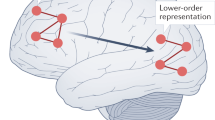Abstract
Wilhelm Wundt (1832–1920) believed that consciousness was represented by the interconnection of psychical processes comprised of temporal elements and compounds. To explore these processes, Wundt used a metronome to measure the amount of information that passed into consciousness across time. The current project replicated some of his procedures, to better understand the role of introspection and the complexity of the metronome task for experimenters and observers. The results of the replication were mixed, but the replication helped provide insights into Wundt’s procedures and their relationship to his theories.



Similar content being viewed by others
References
Benschop R, Draaisma D (2000) In pursuit of precision: the calibration of minds and machines in late nineteenth century psychology. Ann Sci 57:1–25
Bringmann WG, Bringmann NJ, Ungerer GA (1980) The establishment of Wundt's laboratory: an archival and documentary study. In: Bringmann WG, Tweney RD (eds) Wundt studies: a centennial collection. C.J. Hogrefe, Toronto, pp 123–157
Danziger K (1980) Wundt’s theory of behavior and volition. In: Rieber RW (ed) Wilhelm Wundt and the making of a scientific psychology. Plenum Press, New York, pp 89–115
Danziger K (1990) Constructing the subject: historical origins of psychological research. Cambridge University Press, Cambridge
Debru C (2001) Helmholtz and the psychophysiology of time. Sci Context 14:474–478
Diamond S (2001) Wundt before Leipzig. In: Rieber RW, Robinson DK (eds) Wilhelm Wundt in history: the making of a scientific psychology. Kluwer Academic/Penum Publishers, New York, pp 1–63
Leahey T (2000) A history of psychology. Prentice-Hall, New Jersey
Ribot T (1886) German psychology of to-day the empirical school (trans. by James Mark Baldwin). Charles Scribner’s Sons, New York
Robinson D (2001) Reaction-time experiments in Wundt’s institute and beyond. In: Rieber RW, Robinson DK (eds) Wilhelm Wundt in history. Kluwer Academic/Pendum Publishers, New York, pp 161–204
Titchener E (1921) Brentano and Wundt: empirical and experimental psychology. Am J Psychol 32:108–120
Wundt, W (1894/1912) Lectures on human and animal psychology (trans. J. E. Creighton & E. B. Titchener). George Allen & Company, Ltd
Wundt W (1897/1907) Outlines of psychology (trans. by Charles Hubbard Judd). G. E. Stechert & Co, New York
Wundt W (1911/1912) An introduction to psychology (trans. by R. Pinter). George Allen & Company, Ltd
Author information
Authors and Affiliations
Corresponding author
Additional information
This study originated as a class assignment in the Spring of 2004 (see Tweney, this issue).
Rights and permissions
About this article
Cite this article
Ayala, C., Borawski, S. & Miller, J. Replication and Pedagogy in the History of Psychology V: The Metronome and Wilhelm Wundt’s Search for the Components of Consciousness. Sci & Educ 17, 525–535 (2008). https://doi.org/10.1007/s11191-007-9107-5
Received:
Accepted:
Published:
Issue Date:
DOI: https://doi.org/10.1007/s11191-007-9107-5



